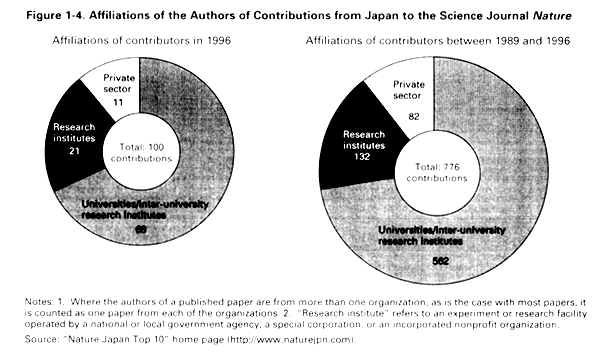| Home > Policy > White Paper, Notice, Announcement > White Paper > JAPANESE GOVERNMENT POLICES IN EDUCATION, SCIENCE, SPORTS AND CULTURE 1997 > Scientific Research Chapter 1 Section 2 1 | ||
Science is a comprehensive, general concept. Its most important element is the systematization of knowledge. Scientific research is a wide-ranging, intellectual, creative activity spanning all disciplines and fields from the humanities and social sciences to the natural sciences. It aims to discover new laws and principles, establish analytical and synthetic methodologies, systematize new knowledge and technologies, and explore advanced fields of learning.
Throughout human history, scientific research the systematization and advancement of knowledge has developed systematically and been accompanied by education and the development of human resources in an environment of freedom. The ancient Greek philosophers gathered in the agora (public forum) to engage in free and lively debate. They formed various schools of thought, such as Stoicism, that enabled their philosophical systems to be handed down and developed. In medieval Europe, the University of Bologna in northern Italy was able to advance legal research and education after gaining its autonomy. Within and influenced by historical and cultural context, humans have eagerly advanced scientific research, primarily in universities, which have served as centers for the systematization of knowledge. This process has provided the foundation for the flowering of civilization and culture.
Thanks to this historical legacy, universities in Japan today are assured the autonomy that enables them to play a central role in scientific research and integrate research activities with education and the training of researchers. In 1996 there were approximately 243,000 researchers in Japanese universities, of whom about 165,000 were working in the natural sciences ( Figure 2-1 ).
Since the industrial revolution in the 18th century, natural science, in particular, has been linked to industrial activity, which has embodied it in technology and continuously improved it. Science and technology have made mass production and mass consumption possible and become indispensable elements of civilization.
In Japan, this kind of research and development has, of course, been conducted mainly by companies in the private sector. In fiscal 1995, this sector accounted for 65.2% of total research expenditure. Of this, 71.3% targeted the development of new or improved materials, devices, systems, and processes; 22.0% was spent on applied research to discover practical uses of knowledge gained through basic research ( Figure 2-7 ). In 1996 large business corporations (those capitalized at \10 million or more) and special corporations not engaged primarily in research employed approximately 384,000 researchers (of whom about 380,000 were conducting research in fields related to the natural sciences). In addition, experiment and research institutions and other facilities operated by national and local government agencies conduct research and development, primarily in fields related to the natural sciences, in line with specific policy goals like contributing to the national economy or industrial development. In 1996 approximately 46,000 researchers were employed in national and other public research institutes and institutes owned by incorporated nonprofit organizations; of these, about 42,000 were involved in work relating to the natural sciences ( Figure 2-1 ).
This type of scientific and technological research and development is also based on scientific research in universities. And only when the results attained by practically oriented research and development have been incorporated into the intellectual systems of scientific research can humanity's intellectual assets be further developed and renovated.
The majority of contributions from Japan to the British science journal Nature are by researchers working in universities and inter-university research institutes ( Figure 1-4 ), an indication that the research carried out in these institutions is highly evaluated by the international community.

| Back to Top | MEXT HOME |